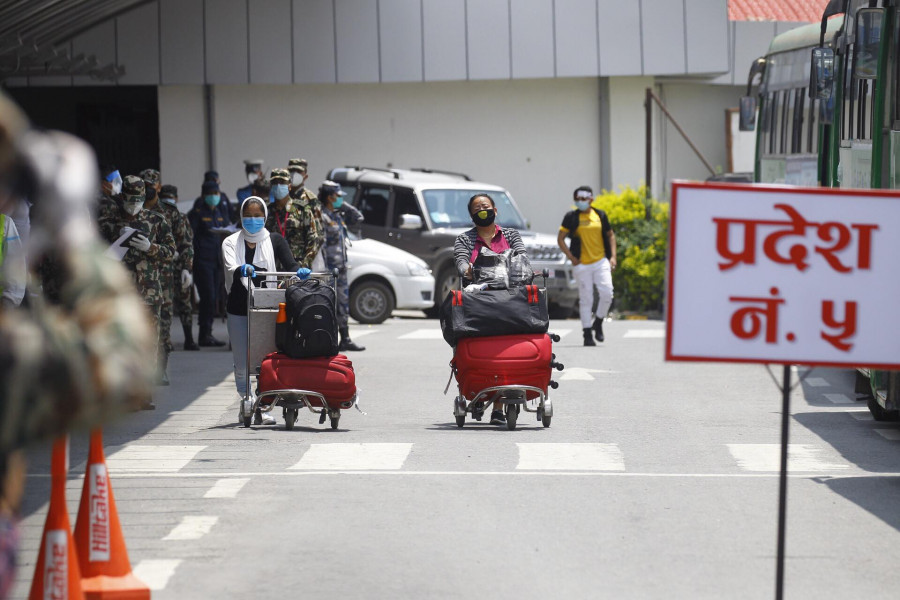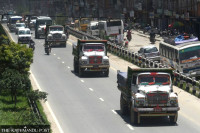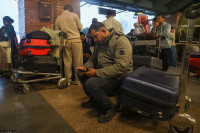National
Women’s rights groups call for safe, dignified repatriation and reintegration of returnee female migrant workers
They have demanded that the government allow registration of illegally migrated women workers with the Foreign Employment Board and ensure the rights of returnee women migrant workers.
Chandan Kumar Mandal
The government should start the registration process of undocumented women migrant workers who had gone on foreign employment through informal channels, women’s rights activists have demanded.
Registering the undocumented or illegal women migrant workers with the Foreign Employment Board in the wake of special circumstances created by the Covid-19 pandemic is one of the demands raised by the women’s rights activists for ensuring rights of the returnee women migrant workers.
As the Nepali migrant workers have started returning home from Covid-19 hit labour destination countries, women’s rights groups—Women-Friendly Disaster Management group, Inter-Generational Feminist Thought Leaders’ Group and Women Humanitarian and Disaster Risk Reduction Platform—have called on the government to make special arrangements for returnee women migrant workers.
The three women’s rights groups have released a common charter of demands for the rights and protection of migrant workers and submitted it to different government agencies, including the Ministry of Labour, Employment and Social Security.
They have said that the board should begin the registration of women migrant workers in line with the provision of Article 38 of the Constitution of Nepal, which outlines the adoption of special arrangements for women’s employment, health and social security, including the provision of special arrangements that can be adopted for women workers in the Foreign Employment Act, 2007.
According to Sharu Joshi Shrestha, a gender and migration expert, the government should allow registration of undocumented female migrant workers who have reached various countries through illegal channels in view of the ongoing humanitarian crisis.
“Once they are registered with the board after contributing the amount to the welfare fund, they can receive services, insurance and compensation provided by the board. They will be entitled to state facilities like other migrant workers,” said Shrestha. “Arrangement should be made so that the undocumented migrant workers or their families back home can deposit the amount to the fund. With registration, they will also get access to the government’s reintegration plans.”
In case of the returnee women migrant workers who are unable to contribute to the welfare fund, the women’s rights activists have suggested making an arrangement where the amount could be deposited to the Corona Pandemic Prevention, Control and Treatment Fund 2076 or to the respective local units.
Although Nepal has placed a ban on sending Nepali women as domestic workers abroad, every year many women migrate for overseas jobs through informal channels owing to their impoverished situation in the country.
Rights activists have been blaming that the government’s restrictive approach of putting a blanket ban on women migrant workers has forced Nepali women to migrate through illegal and unsafe routes, making them more vulnerable.
According to rights activists, registration with the board will offer much-needed respite to the women migrant workers who are working in hiding or seeking refuge elsewhere. The registration will also protect them from frauds and traffickers.
The joint memorandum of the women’s rights groups has also raised concerns about the government’s handling of returning migrant workers from abroad.
They have demanded for a dignified repatriation and reintegration of female migrant workers, which they say was apparently lacking when Nepali women workers were repatriated from Kuwait recently.
The rights groups have pointed out that the Kuwaiti government facilitated the return of women from Kuwait, and the Nepal government did not have to spend any funds.
However, the returnee migrant workers were sent to their respective places from the government’s holding centres in Kathmandu by different organisations, showing a lack of concrete rehabilitation plans on the part of the government.
“In order to ensure that the returnee women migrant workers do not face further indignities and insecurities, the government should provide residential facilities that meet minimum standards of infrastructural amenities, psychosocial counselling and health check-ups according to their needs,” reads the joint memorandum. “Furthermore, their inclusion in reintegration programmes with dignity should be treated as a priority.”
They have also demanded that the government should immediately rescue undocumented women migrant workers working in other countries other than popular labour destination countries or taking refuge in embassies. They have also called for a proper plan for their rehabilitation and reintegration in the society.
“Migrant workers, in general, are brought from various countries. After landing in Kathmandu, they are kept at holding centres before they are sent to their districts,” said Shrestha. “But what next? How will they be integrated into their society? Women workers should also get equal treatment like male workers. Just bringing home is not enough. Absence of such plans would only make women migrant workers more vulnerable.”




 21.06°C Kathmandu
21.06°C Kathmandu















